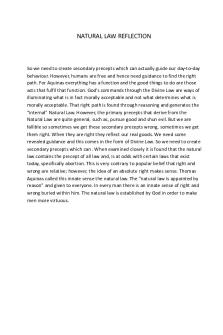Tutorial - Natural LAW - Criticisms OF Natural LAW PDF

| Title | Tutorial - Natural LAW - Criticisms OF Natural LAW |
|---|---|
| Course | Jurisprudence and Legal Theory |
| Institution | Universiti Malaya |
| Pages | 3 |
| File Size | 93.4 KB |
| File Type | |
| Total Downloads | 119 |
| Total Views | 296 |
Summary
Jurisprudence Tutorial............................................... Criticisms of Natural law Describe and critically explain the main criticisms of natural law. 4 criticisms 1. Criticism 1 - By David Hume - Normative value? – i eat to live? – life is important, human nature to live, to protect li...
Description
Jurisprudence Tutorial ………………………………………..
Criticisms of Natural law
Describe and critically explain the main criticisms of natural law. 4 criticisms 1. Criticism 1 - By David Hume - Normative value? – i.e eat to live? – life is important, human nature to live, to protect life - Not strong enough statement to the problem – the is or the ought – why is it not satisfactory enough?? – there’s no certainty – especially in personal rights (euthanasia – voluntary termination of life) o Some might critic: not different from assisting suicide? In some country, it’s illegal – ‘facilitating murder’ o Some in western society : it’s not a crime
-
-
This ‘is’ -> The ‘ought’ Criticism of the ‘ought’ normative value as being intrinsic in factual reality IS = man have to eat (nature) OUGHT = self preservation (ought to be) an essential value to man – hence, man ought to want peace/security Kelsen – ‘value is not immanent in natural reality, Hence value cannot be deduced from reality. o It does not follow from the fact that something is, that it ought to be or to be done, or that it ought not to or not to be done. o The fact that in reality big fish swallow small fish does not imply that the behaviour of the fish is good, nor yet that it is bad. There is no logical inference from the ‘is’ to the ‘ought’, from natural reality to moral or legal value” [The OUGHT is just a deduction from the IS; so you cannot say that the OUGHT is very CERTAIN enough – to the extent of being ‘universal’ or natural value]
2. Criticism 2
-
Alf Ross – ‘like a harlot, natural law is at the disposal of everyone’
-
NL values – inconsistent/incoherent o promote dictatorship/authoritarianism
[e.g philosopher king, ‘Leviathan’ ]
o compare: ‘natural rights’;
individualism, liberalism.
3. Criticism 3
-
If natural law is SO self-evident – then who need positive law. o [ie. Positive law would be superfluous; foolish to waste time making/promulgating law]
4. Criticism 4
-
If NL proponents say: bad law not good law, why they do not prescribed disobedience o
-
[a logical conclusion for one who accept that bad law should not be followed] ?
NL promotes anarchy????
Other criticisms! -
NL arguments -> religious values through the back door
-
Political influence over ‘definition’ of NL values.
-
[i.e. law]
produced by those in ‘power’
Practical issue:
NL multiple values vs the desire for certainty and consistency of ‘law’
Positivist Criticism -
The validity of a law shouldn’t be determined by its morality / according to external standards
-
Critical of the notion: ‘an unjust law is not a law’ – lex injusta non est lex
-
Decline of NL – Historical observation
o Positivist criticism has been an Anglo- American phenomenon. -
c.f. Western Europe civil law approach
The rise of legal positivism and the [may be] decline of NL -> development in legal history 18- 19 century England
-
(Ref: lecture)
the narrative of ‘law’ monopolised by the legal profession
Industrialisation and commercial activity -> bureaucratic demand for law to be certain and consistent; -> ‘law in the book’
NL approach is too ‘elusive’, impractical...
Similar Free PDFs

Natural Law
- 2 Pages

Natural law vs positive law
- 4 Pages

Modern Natural law theory
- 15 Pages

Lon Fuller - Natural Law
- 2 Pages

Natural LAW Reflection
- 1 Pages

AO1 - Finnis Natural Law
- 2 Pages

Natural Moral Law revision
- 4 Pages

Natural Law - NOTES
- 18 Pages

Natural Law - Lecture notes 1
- 8 Pages

Natural Law - Lecture notes 1
- 4 Pages

Objections to Natural Law Theory
- 4 Pages

A critique of natural law theory
- 10 Pages
Popular Institutions
- Tinajero National High School - Annex
- Politeknik Caltex Riau
- Yokohama City University
- SGT University
- University of Al-Qadisiyah
- Divine Word College of Vigan
- Techniek College Rotterdam
- Universidade de Santiago
- Universiti Teknologi MARA Cawangan Johor Kampus Pasir Gudang
- Poltekkes Kemenkes Yogyakarta
- Baguio City National High School
- Colegio san marcos
- preparatoria uno
- Centro de Bachillerato Tecnológico Industrial y de Servicios No. 107
- Dalian Maritime University
- Quang Trung Secondary School
- Colegio Tecnológico en Informática
- Corporación Regional de Educación Superior
- Grupo CEDVA
- Dar Al Uloom University
- Centro de Estudios Preuniversitarios de la Universidad Nacional de Ingeniería
- 上智大学
- Aakash International School, Nuna Majara
- San Felipe Neri Catholic School
- Kang Chiao International School - New Taipei City
- Misamis Occidental National High School
- Institución Educativa Escuela Normal Juan Ladrilleros
- Kolehiyo ng Pantukan
- Batanes State College
- Instituto Continental
- Sekolah Menengah Kejuruan Kesehatan Kaltara (Tarakan)
- Colegio de La Inmaculada Concepcion - Cebu



